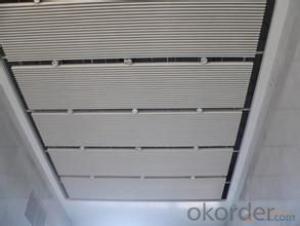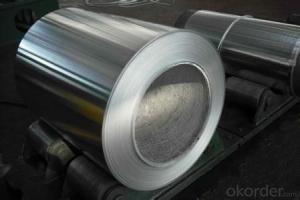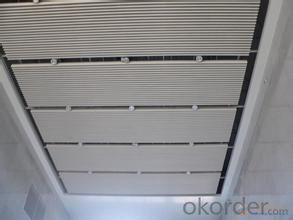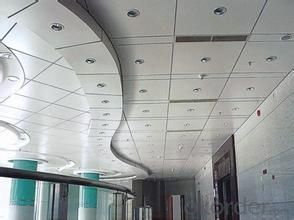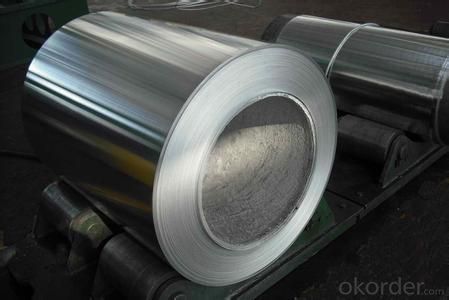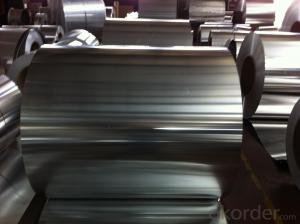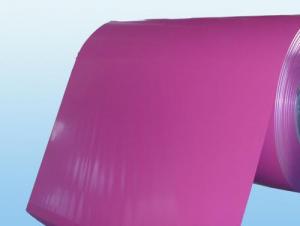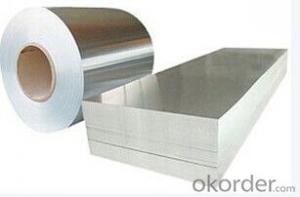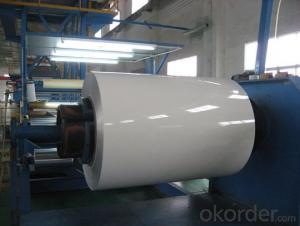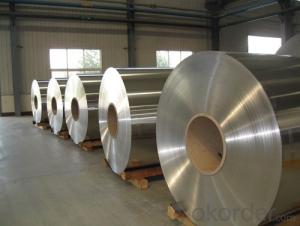1100 Aluminum Coils for Ceiling - Alu Coil for Sale
- Loading Port:
- China Main Port
- Payment Terms:
- TT OR LC
- Min Order Qty:
- -
- Supply Capability:
- -
OKorder Service Pledge
OKorder Financial Service
You Might Also Like
Aluminium is a relatively soft, durable, lightweight, ductileand malleablemetalwith appearance ranging from silvery to dull gray, depending on the surfaceroughness. It is nonmagnetic and does not easily ignite. A fresh film ofaluminium serves as a good reflector (approximately 92%) of visible lightand an excellent reflector (as much as 98%) of medium and far infraredradiation. The yield strength of pure aluminium is 7–11 MPa,while aluminium alloys have yield strengths ranging from200 MPa to 600 MPa. Aluminium has about one-third the densityand stiffness of steel. It is easily machined,cast, drawn and extruded.
Aluminium alloys (or aluminum alloys; see spellingdifferences) are alloysin which aluminium(Al) is the predominant metal. The typical alloying elements are copper, magnesium,manganese,silicon,tin and zinc. There are twoprincipal classifications, namely casting alloys and wrought alloys, both of which are furthersubdivided into the categories heat-treatableand non-heat-treatable. About 85% of aluminium is used for wrought products,for example rolled plate, foils and extrusions.Cast aluminium alloys yield cost-effective products due to the low meltingpoint, although they generally have lower tensile strengthsthan wrought alloys. The most important cast aluminium alloy system is Al–Si,where the high levels of silicon (4.0–13%) contribute to give good castingcharacteristics. Aluminium alloys are widely used in engineering structures andcomponents where light weight or corrosion resistance is required
Specification:
Alloy: AA1050, 1060, 1100,AA3003, 3005, 3015, 5052, 5754, 5083,8011, etc
Temper:H14/16/18/22/24/32, HO etc.
Thickness:0.2mm—100mm
Width: 100mm—2300mm (Can be slitted)
InnerDiameter: 508MM
Coil Weight:500kg-3000kg(Max.)
Application:Foil stock, Circles, Roofing, Can stock, Marine plate,Anti-slipery purpose in vehicles, packing and appliance.
Features:
1. Excellent quality of products
2. Quick delivery
3. Best service to clients
4. BV,SGS avalible
5. No buckle o waveness
6. Tension leveling
7. Certificate of Origin
8. Form A,E
Packaging Detail:
Carton ,Woodenpallet with plastic protection packing ,standard seaworthy packing or as yourrequest.
ProductionCapacity:
AnnualProduction capacity of 600,000 tons.
Products areexported to United States, Canada, U.A.E, Brazil, Mexico,Thailand, Vietnam,Nigeria etc, over 100 countries andregions all over the world.
Production Line:
CNBM aluminumproduction base is comprised of 18 aluminumannealers, 10 coil and foilmills, 4 continuous production lines, 2hot rolling production line and 3prepainted lines.
FAQ:
1. What is the form of payment?
Normally 30% TT, L/C
2. Type of quotation?
FOB, CFR, CIF
3. Port of loading?
Shanghai port
4. Delivery time?
30 day after client’s deposit
- Q: Are there any health risks associated with aluminum coils?
- Aluminum coils provoke some concerns due to their potential health risks. Coils made of aluminum are commonly utilized in the construction of air conditioning and refrigeration systems. However, when aluminum comes into contact with certain acids, like those present in some cooling agents and cleaning solutions, it can corrode and release aluminum ions into the surrounding air. The inhalation of these aluminum ions may entail health risks, especially for individuals with respiratory conditions or allergies. Moreover, there have been reports indicating a possible connection between aluminum exposure and certain health problems, such as Alzheimer's disease and breast cancer. Nevertheless, scientific research on this association remains inconclusive and ongoing. It is important to acknowledge that aluminum is a naturally occurring element that can be found in many foods, water sources, and even the air we breathe. Additionally, it is employed in various consumer products, including cookware and food packaging. To minimize potential health risks, it is advisable to ensure the proper maintenance and cleaning of air conditioning and refrigeration systems to prevent the accumulation of corrosive substances. Changing air filters regularly and utilizing appropriate cleaning solutions can aid in reducing the likelihood of aluminum corrosion. Additionally, individuals with pre-existing respiratory conditions or allergies may want to consider consulting with a healthcare professional to determine any specific precautions they should take.
- Q: Can aluminum coils be used in the production of aluminum sandwich panels?
- Aluminum sandwich panels can indeed utilize aluminum coils. Typically, these coils serve as the outer skins or facings of the panels. To enhance their durability, resistance to corrosion, and aesthetic appeal, the coils undergo initial processing and coating. This process ensures that they possess the desired qualities. Subsequently, they are bonded with a core material, such as polyethylene or mineral wool, to create a sandwich panel structure that is both lightweight and rigid. The inclusion of aluminum coils provides the panels with exceptional mechanical properties, including a high strength-to-weight ratio, flexibility, and thermal conductivity. Moreover, the use of aluminum coils enables convenient customization as they can be formed, shaped, and painted to meet specific design and specification requirements.
- Q: I'm doing a project on aluminum and this is the one thing i can't find. Also will it rust, tarnish or corrode?
- Aluminum is actually highly reactive. Under normal conditions, its outer layer quickly forms a coating of aluminum oxide which is extremely hard and well-attached. This prevents any further corrosion or oxidation. Molten aluminum will react explosively with water; this is a well-known danger in the aluminum casting industry. Very finely powdered aluminum is pyrophoric (self-igniting in air) and is used as a component in flash powder and some solid rocket fuels.
- Q: How do aluminum coils contribute to sustainable transportation systems?
- Aluminum coils contribute to sustainable transportation systems by being lightweight, durable, and recyclable, which helps reduce the overall weight of vehicles, resulting in improved fuel efficiency and reduced emissions. Additionally, the recyclability of aluminum coils promotes a circular economy, minimizing waste and conserving resources.
- Q: What is the typical coil diameter for aluminum coils?
- The typical coil diameter for aluminum coils can vary depending on the specific application and industry requirements. However, in general, aluminum coils typically have a diameter ranging from 12 inches to 72 inches. The specific diameter is determined by various factors such as the thickness of the aluminum sheet, the desired coil weight, and the equipment used for processing and handling the coils. Different industries, such as automotive, construction, and packaging, may have specific coil diameter specifications based on their unique manufacturing processes and end-use requirements.
- Q: I would like to know because I'm getting a sword with an aluminum sheathe.
- That would depend on The Alloy and the Condition The alloy is the elements in percent that make up that material. The Condition is the heat treat of that alloy. Reffered to as Treatment when it comes to Aluminum Examples: 2024 T4 6061 T6 6063 T6 7075 T7 Etc,etc,etc,etc.................... Saying the word Aluminum is like saying the word Wood (Which One?) Aluminum can range from..what is this stuff,so soft and bends so easy To what the hell is this stuff, so dam hard stiff,and it just won't bend!! Oh,and 30 year boy........sit down.......30 years,and that is all you could come up with!!!! 30 years of drinking coffee,joking with the boss,and goofing off.You may want to sit the beer down and read up on the material you have been working with for 30 Years!!!!!
- Q: Are aluminum coils recyclable?
- Yes, aluminum coils are recyclable. Aluminum is a highly recyclable material, and it can be melted down and reused to make new products, including coils. Recycling aluminum helps conserve natural resources and reduce energy consumption.
- Q: The user is asking if it's possible to recycle old aluminum coils to create new ones.
- <p>Yes, you can recycle old aluminum coils into new ones. Recycling aluminum is a highly efficient process, and it's very common in the industry. Aluminum has one of the highest recycling rates among metals due to its value and the energy savings associated with recycling compared to producing new aluminum from raw materials. When you recycle aluminum, it can be melted down and reformed into new coils or other products without losing its properties. This process helps conserve resources and reduces environmental impact.</p>
- Q: How do aluminum coils contribute to energy-efficient lighting systems?
- Aluminum coils contribute to energy-efficient lighting systems by improving the heat dissipation process. When used in the construction of LED lighting fixtures, aluminum coils help in efficiently transferring heat away from the LED chips, preventing overheating and reducing energy consumption. This improved heat management ensures that the lighting system operates at optimal temperature, thereby extending the lifespan of the LEDs and enhancing overall energy efficiency.
- Q: Can aluminum coils be used in the manufacturing of aircraft parts?
- Yes, aluminum coils can be used in the manufacturing of aircraft parts. Aluminum is a popular choice for aircraft construction due to its desirable properties, such as lightweight, corrosion resistance, and high strength-to-weight ratio. Aluminum coils can be easily shaped into various forms, making them suitable for creating different components of an aircraft, including fuselage panels, wings, and structural parts. These coils can be further processed through techniques like rolling, extrusion, and forming to achieve the desired dimensions and structural integrity required for aircraft parts. Additionally, aluminum's ability to conduct heat and electricity efficiently makes it useful for applications where temperature control and electrical conductivity are important, such as in heat exchangers and electrical wiring systems within an aircraft. Overall, aluminum coils are a versatile and widely used material in the manufacturing of aircraft parts.
Send your message to us
1100 Aluminum Coils for Ceiling - Alu Coil for Sale
- Loading Port:
- China Main Port
- Payment Terms:
- TT OR LC
- Min Order Qty:
- -
- Supply Capability:
- -
OKorder Service Pledge
OKorder Financial Service
Similar products
Hot products
Hot Searches
Related keywords
